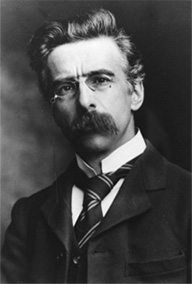John Joly (1857-1933)
“The sediments of the past are many miles in collective thickness: yet the feeble silt of the rivers built them all from base to summit.“ - John Joly (1857-1933)
John Joly was an Irish geologist, physicist, engineer and also an inventor. He entered Trinity College in 1876, graduating in engineering in 1882 in first place while at the same time obtaining a First Class Honours in modern literature. He worked as a demonstrator in Trinity's engineering and physics departments before succeeding William Johnston Sollas as the Chair of Geology and Mineralogy in 1897, which he held until his death in 1933.
Joly joined the Royal Dublin Society in 1881 while still a student and was a frequent contributor of papers. During his career he wrote over 270 books and scientific papers. His first scientific paper was published in 1883 on the use of meteorological instruments at a distance. On 17 May 1899 Joly read his paper, "An Estimate of the Geological Age of the Earth" to the Royal Dublin Society. In it, he proposed to calculate the age of the earth from the accumulation of sodium in the waters of the oceans. He calculated the rate at which the oceans should have accumulated sodium from erosion processes, and determined that the oceans were about 80 to 100 million years old. Although this method was later considered inaccurate and was consequently superseded, it radically modified the results of other methods in use at the time.

Joly’s contributions covered many disciplines. Along with his friend Henry Horatio Dixon, Joly proposed the cohesion-tension theory that currently is thought to be the main mechanism for the upward movement of water in plants. Additionally, Joly is best remembered for the development of radiotherapy in the treatment of cancer and the invention of the ‘Joly colour process’, which was the first practical method for colour photography. After Joly’s death, his friends subscribed the sum of £1,700 to set up a memorial fund that is still used to promote the annual Joly Memorial Lectures at the University of Dublin, which were inaugurated by Sir Ernest Rutherford in 1935.
Find out more about John Joly:

